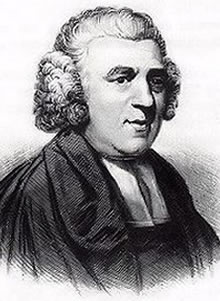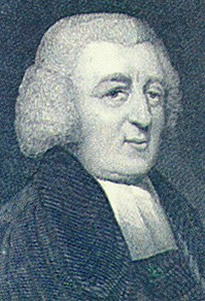John Newton
“1725 – 1807”

John Newton (1725-1807)

John Newton (1725-1807)
A marble plaque at St. Mary Woolnoth carried the epitaph which Newton himself wrote:
JOHN NEWTON, Clerk
Once an infidel and libertine
A servant of slaves in Africa,
Was, by the rich mercy of our Lord and Saviour
JESUS CHRIST,
restored, pardoned, and appointed to preach
the Gospel which he had long laboured to destroy.
He ministered,
Near sixteen years in Olney, in Bucks,
And twenty-eight years in this Church.
Graça Sublime
→ Entre as contribuições de Newton que ainda são amadas e são cantadas nos dias de hoje são “Quão doce são os sons do nome de Jesus” e “Coisas Gloriosas são faladas do Senhor”, como também a ” Graça Sublime“. Provavelmente composta entre 1760 e 1770 em Olney, a ” Graça Sublime” foi possivelmente um dos hinos escrito para um serviço semanal. Através dos anos, outros escritores compuseram versos adicionais ao hino que chegou a ser conhecido como a ” Graça Sublime” (não foi intitulado assim em Hinos de Olney), e possivelmente versos de outro hinos de Newton foram adicionados. Porém, estas são as seis estrofes que se apareceram, com variações de ortografia secundárias, em ambos a primeira edição em 1779 e a edição de 1808, o mais próximo a data da morte de Newton. Surgiu sob a leitura Revisão de Fé e Expectativa, juntamente com uma referência para I Crônicas, capítulo 17, versos 16 e 17.
Amazing Grace
→ Among Newton’s contributions which are still loved and sung today are “How Sweet the Name of Jesus Sounds” and “Glorious Things of Thee Are Spoken,” as well as “Amazing Grace“. Composed probably between 1760 and 1770 in Olney, “Amazing Grace” was possibly one of the hymns written for a weekly service. Through the years other writers have composed additional verses to the hymn which came to be known as “Amazing Grace” (it was not thus entitled in Olney Hymns), and possibly verses from other Newton hymns have been added. However, these are the six stanzas that appeared, with minor spelling variations, in both the first edition in 1779 and the 1808 edition, the one nearest the date of Newton’s death. It appeared under the heading Faith’s Review and Expectation, along with a reference to First Chronicles, chapter 17, verses 16 and 17.
Amazing Grace – Original Verses
Amazing grace! (how sweet the sound)
That sav’d a wretch like me!
I once was lost, but now am found,
Was blind, but now I see.
‘Twas grace that taught my heart to fear,
And grace my fears reliev’d;
How precious did that grace appear,
The hour I first believ’d!
Thro’ many dangers, toils and snares,
I have already come;
‘Tis grace has brought me safe thus far,
And grace will lead me home.
The Lord has promis’d good to me,
His word my hope secures;
He will my shield and portion be,
As long as life endures.
Yes, when this flesh and heart shall fail,
And mortal life shall cease;
I shall possess, within the veil,
A life of joy and peace.
The earth shall soon dissolve like snow,
The sun forbear to shine;
But God, who call’d me here below,
Will be forever mine.
|
|---|
Amazing GraceModern lyrics to Amazing Grace:Amazing grace! How sweet the sound ’Twas grace that taught my heart to fear, Through many dangers, toils and snares The Lord has promised good to me, Yea, when this flesh and heart shall fail, The earth shall soon dissolve like snow, When we’ve been there ten thousand years |
Graça SublimeTradução por Daniel BorgesOh! Sublime graça do Senhor, Tua graça me ensinou temer, Batalhas mil eu enfrentei, Deus me prometeu Sua porção, Falhando a carne e o coração, O mundo dissolverá como a neve, Dez mil anos Contigo habitar, |
Jefferson dos Santos Felix Maria Beatriz da Silva Borges

Achava-se ali um homem que, havia trinta e oito anos, estava enfermo. Jesus, vendo-o deitado e sabendo que estava assim havia muito tempo, perguntou-lhe: Queres ficar são? Respondeu-lhe o enfermo: Senhor, não tenho ninguém que, ao ser agitada a água, me ponha no tanque; assim, enquanto eu vou, desce outro antes de mim. Disse-lhe Jesus: Levanta-te, toma o teu leito e anda.
